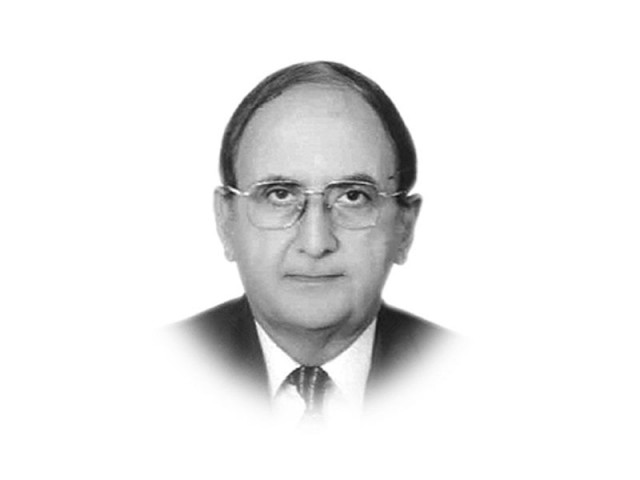Political options for the PML-N
Even if Nawaz Sharif decides to step down as PM, he can still exercise his leadership from the outside

The writer is an independent political and defence analyst. He is also the author of several books, monographs and articles on Pakistan and South Asian affairs
The federal cabinet has lost its importance as a policymaking agency. It has not met on a regular basis in 2016 and matters are settled through informal interaction with a few select top leaders of the PML-N. The fate of parliament, especially that of the National Assembly, is not very different. The two houses have lost some of their salience because the prime minister hardly attends any sessions. Cabinet members are often absent. Members showed little interest in the budget debate in the National Assembly earlier this month and there was a serious problem of maintaining the quorum. The National Assembly cannot become a focal power centre if the prime minister, cabinet members and other senior members shy away from attending its sessions or leave the house after a very brief presence. The prime minister has been out of the country for medical reasons for over a month. Ishaq Dar and a small groups of associates are looking after state affairs. There is no constitutional provision for such a substitution of the prime minister. By pursuing an extra-constitutional strategy, the PML-N has exposed the redundancy of the office of prime minister and shown that a small group consisting of the political elite and top bureaucrats can run the state. Unless some constitutional amendment is made to cover this gap, the wrong precedent has been set that can be employed by other competing political interests.
The PML-N government appears to be satisfied with the economy, as demonstrated by Dar’s statements in connection with the budget. This optimism is not shared by those not belonging to the ruling party. The finance minister appears so confident of the economic options available to the people that he recently suggested that they should eat chicken if they cannot afford daal. What about those who do not have resources to buy chicken? The major threat to the democratic political order is the overconfidence of the ruling party at the federal level and the desperation of the opposition. The PML-N and especially the political team around the prime minister are convinced that the government is secure and the opposition has no popular support and that it comprises some rootless power seekers, who cannot stop the PML-N from completing its term of office and then winning the next general elections.
The PML-N needs to adopt a more realistic approach towards what is happening outside the ruling circles. It should not deny that there is widespread alienation outside the ruling circles. The stalemate between the government and the opposition will not help the former to stay in office peacefully. If the PTI, the PPP and Dr Tahirul Qadri join hands to challenge the government on the streets of Lahore and other cities of Punjab, there will be much instability and uncertainty about the future direction of politics. Then if the joint opposition street protests persist for some time, other parties are likely to join them. This can also encourage the dissatisfied elements in the PML-N to shy away from supporting the current ruling group. The opposition appears to be opting for a final showdown with the PML-N because it feels that given the non-accommodating disposition of the government and the gradual strengthening of the house of Sharif and its beneficiaries, this may be their chance to stay in the game of politics.
After the return of the prime minister to Pakistan, the PML-N can deal with the internal political situation through different strategies. It may continue with the present policy of living under a self-cultivated perception that everything is excellent and that the opposition lacks the capacity to take it on. This will mean no flexibility or accommodation towards the opposition on any issue and treating its agitation as a law and order issue. A compromise on some issues is another option. However, such a compromise formula can work only if this offer is made in the initial stages of the protest. The compromise could be on investigations of the Panama Leaks. However, this can drag the prime minister into a major political crisis.
The prime minister can undertake a major change in his cabinet by bringing in professional people and those more acceptable to the opposition. Another option would be an in-house change of leadership. Nawaz Sharif decides to quit and appoints a person from his party in consultation with some people outside the PML-N. The new prime minister should not be from the House of Sharif. Nawaz Sharif can exercise his leadership from the outside because he will continue to be the main vote-puller for the PML-N. The best option is to first seek political accommodation with the opposition. If this does not work, the prime minister should opt for new elections before the end of 2016. If he can renew his mandate, he will overcome most of his current problems. Political events are expected to move fast in the near future. At the moment, the initiative is with the prime minister. This may not remain the case if his current political problems are allowed to fester.
Published in The Express Tribune, June 27th, 2016.
Like Opinion & Editorial on Facebook, follow @ETOpEd on Twitter to receive all updates on all our daily pieces.
















COMMENTS
Comments are moderated and generally will be posted if they are on-topic and not abusive.
For more information, please see our Comments FAQ